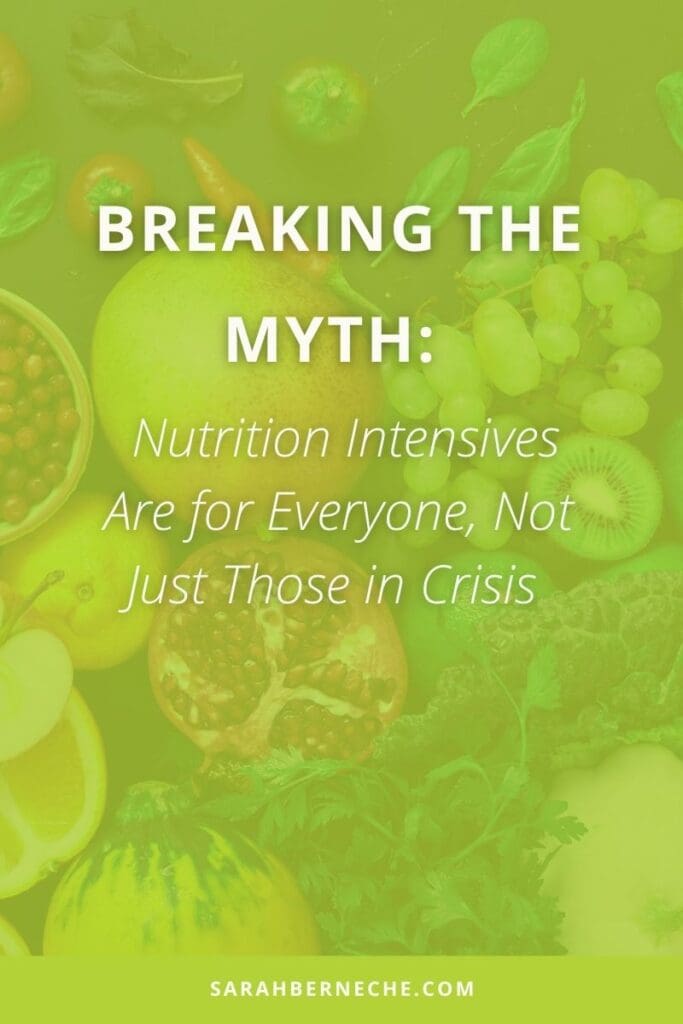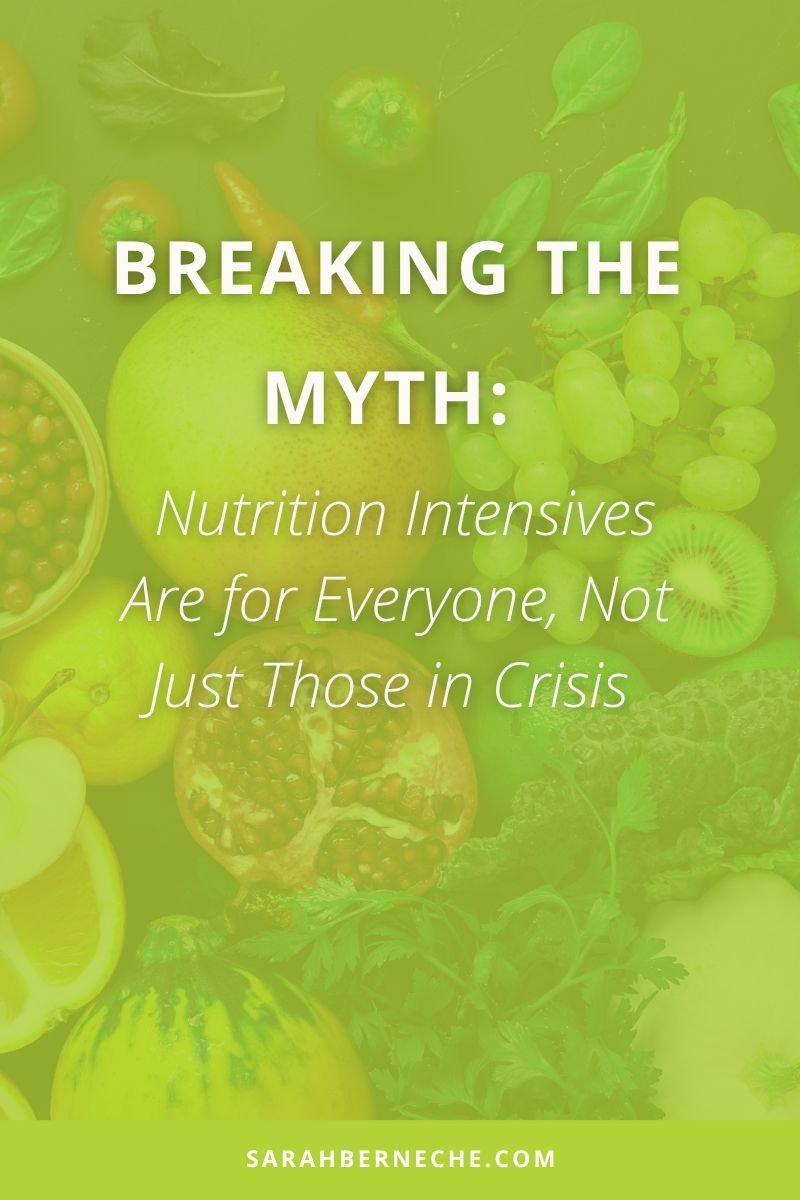When you hear the phrase ‘Nutrition Intensive,’ you might imagine someone in the throes of eating disorder recovery, or seeking to overhaul their entire diet. But that’s only part of the picture. Nutrition intensives aren’t just for folks in crisis. Instead, they’re for anyone ready for a reset, ambitious and time-strapped professionals whose schedules make regular meetings impossible, and for anyone seeking to do targeted, deep work.

What is a nutrition intensive?
Before we get any further, what is a nutrition-intensive? Unlike 1:1 nutrition counselling, where we meet weekly or bi-weekly, Intensives are 2+ hour sessions that take place over 1-3 days, scheduled as needed (e.g., monthly). Unlike my regular 1:1 sessions, they’re available in person and on the weekend (at a slightly higher rate).
Here’s why I love nutrition intensives as both a practitioner and a client:
- You can make progress faster. Rather than spending 2-3 sessions identifying what’s triggering your binges—that’s over a month at a bi-weekly cadence—we can nail it down in 1-2 days. Think of it like a Disney Fast Pass, or, if you’re a Torontonian, taking the water taxi instead of the ferry.
- The work is focused and targeted. Have you ever covered something really important during one therapy session…only to move on to a totally different topic the next? While you can make progress this way, Intensives allow the work to be planned, focused, and targeted, so we can really go deep in one area (e.g. what’s making you feel so uncomfortable in your body).
- It saves money. Frequent and consistent work or intensive work is more cost-effective in the long run than infrequent sessions. The more often you meet, the less time you spend catching up. Secondly, you can get into the details—and the devil is in the details—rather than talking big-picture. Third, it keeps your attention focused on your goals. What gets prioritized progresses.
- Schedule them on your time. If you’re in back-to-back meetings or constantly travelling for work through various time zones, Intensives can be a great option for you.
Think of an intensive like a private retreat created just for you.
Because intensives offer concentrated support, people often assume they’re a last resort or that, as the client, they need to be struggling significantly to benefit from them. But more and more, clients are using intensives proactively—to build momentum and get where they want to go, faster.
Who actually benefits from a nutrition intensive?
Nutrition intensives are ideal for those who:
- Feel stuck in weekly or bi-weekly sessions, like they’re looping or spinning their wheels
- Have limited time and want to make the most of it
- Want to go deeper in one focused area (e.g. binge eating, gentle nutrition, working through exercise hesitance, body image)
- Dislike topic switching that can happen from one session to the next
- You don’t have the financial means for ongoing sessions, but you would like a “starter pack.”
While nutrition intensives are customized to meet your needs, here are 5 samples to give you a sense of how these can look:
*Please note: Intensives begin with a grounding/arrival exercise (if desired), end with a proper closing and future planning, and include short breaks.
Rebuilding Trust In Your Body: Emotional Eating Intensive (3 Hours)
- Hour 1: Intake session
- Hour 2: Emotional Eating “Contributors” (e.g. emotional restriction, physical restriction, eating patterns, self-care, nervous system states, etc.)
- Hour 3: Hunger and Satisfaction + Closing (e.g. emotional hunger, physical hunger, identifying hunger cues, plating methods, the role of satisfaction, etc.)
Coming Home to Your Body: Body Image Intensive (3 Hours)
- Hour 1: Intake session
- Hour 2: Body Image Map (e.g. your body image history, thoughts and beliefs you hold about your body)
- Hour 3: Body Image Decoding + Closing (e.g. what’s behind “I feel uncomfortable,” uncovering body image ‘protectors’, regulation strategies to reduce the distress you feel in your body.)
Binge Eating Fundamentals: Nutrition Intensive (4 Hours)
- Hour 1: Intake session
- Hour 2: Binge Eating Drivers + Triggers (e.g. uncover the reason(s) you binge, identify triggers, etc.)
- Hour 3: Nutrition Education (e.g. basic nutrition education, plating, dealing with forbidden foods, guilt and shame with food)
- Hour 4: Containment + Closing (e.g. nervous system mapping, nervous system regulation strategies to surf binge urges.)
Eating Disorder Recovery Intensive (4.5-5 Hours)
- Hour 1: Intake session
- Hour 2: Meal Planning and Grocery Shopping
- Hours 3 + 4: Cooking/Meal Preparation (e.g. breakfasts, lunches, dinners, and snacks)
- Hour 5: Meal Support + Nervous System Support
Eating Disorder Recovery Intensive (Condensed; 3 Hours)
- Hour 1: Meal Planning and Grocery Shopping (intake completed previously)
- Hours 2 + 3: Cooking/Meal Preparation (e.g. breakfasts, lunches, dinners, and snacks)
Intensives may also be broken up over days, weeks, and months to suit your individual processing needs, nervous system, budget, and timeline (while keeping the 2-hour minimum in mind).
You don’t have to be in crisis to feel better
Many clients come in feeling ambivalent about nutrition work. “Things aren’t that bad. Do I even need nutrition work?” They might ask. But at the same time, they believe there must be more to calorie counting and feeling distressed about their appearance. And the truth is, they can feel a lot better. Nutrition intensives meet that need with compassionate, targeted support.
Wondering if a nutrition intensive could help you feel more grounded, clear, or emotionally present? Schedule a free consultation to talk it through.

Learn More:
Keep Reading:
- Is Binge Eating a Sign You Lack Willpower? (Spoiler: No)
- Why You Binge Eat When You’re Not Hungry
- Five Facts to Know About Binge Eating
- How to Stop Binge Eating on the Weekend
- Binge Eating and Trauma: A Nervous-System Perspective

Comments +